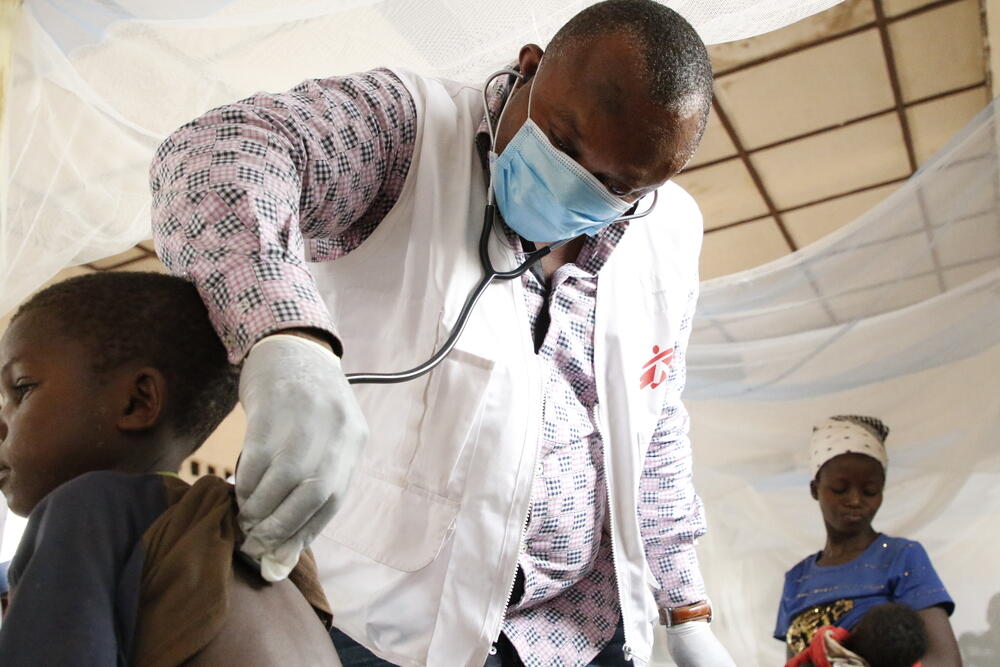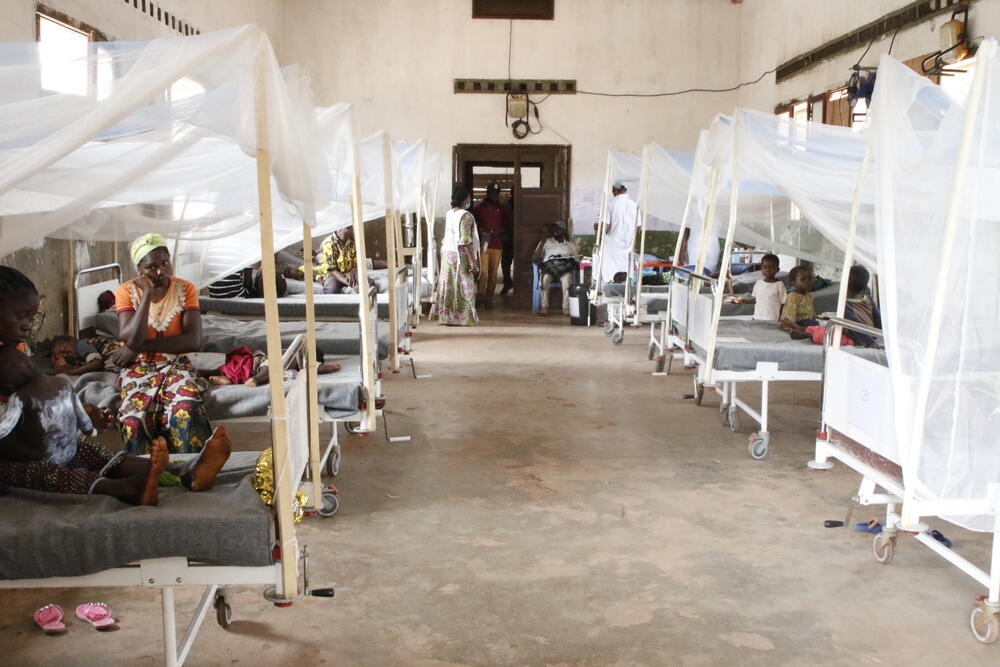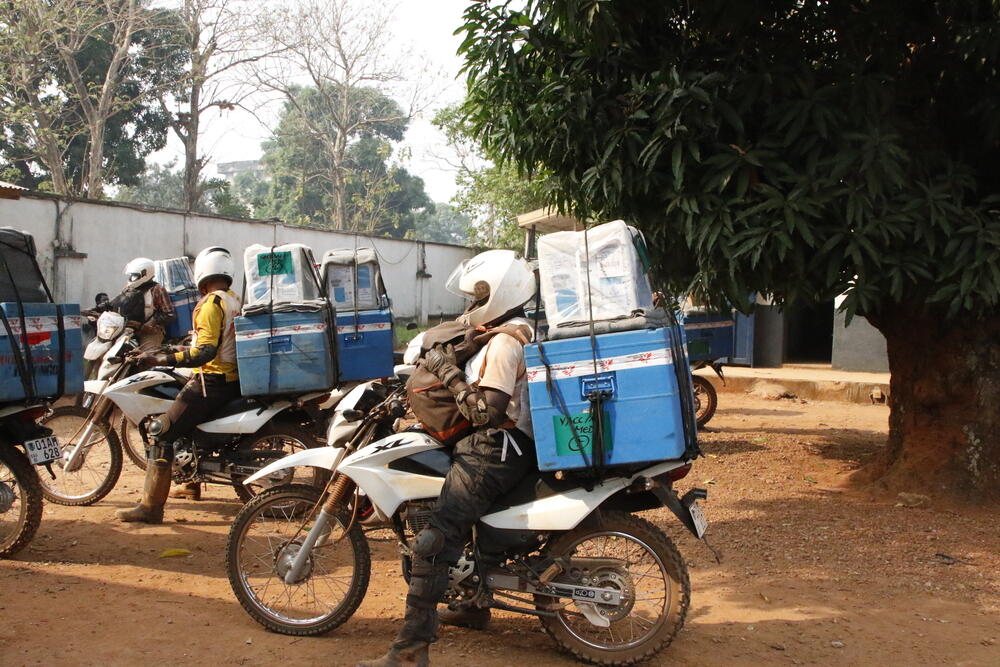Measles: Surge in world’s most contagious disease killing children in DRC
Measles is once again on the rise in the Democratic Republic of Congo (DRC), with MSF teams responding to a major surge of more than 13,000 cases since the start of 2021.
This comes less than a year after the end of the worst measles epidemic ever recorded in DRC, tearing through the country between 2018 and 2020.
In just two years, more than 460,000 children contracted the disease and nearly 8,000 died from it. Three-quarters of them were under five years old.
At the time, MSF deployed emergency teams in 22 of the country’s 26 provinces, tracking virus hotpots, treating 90,000 patients and vaccinating more than 2.3 million children.
“Measles is the most contagious disease in the world, nearly 10 times more than COVID-19”
These emergency responses were followed by a vaccination campaign set up by the authorities to reach millions of children. This greatly reduced the number of patients but unfortunately did not cut the chain of transmission.
Despite this danger, in August 2020, the Minister of Health declared the end of the epidemic.
Emergency teams
“Unfortunately, since the end of 2020, several provinces have started recording new increases in patients with measles, notably the North and South Ubangi provinces,” says Anthony Kergosien, coordinator of MSF’s emergency team in the DRC.
"We had to urgently send mobile response teams again to help stem the progression and save as many lives as possible."
In December, MSF sent a team to the Bogose-Nubea health zone in South Ubangi. The needs they found there were massive.
In only a few weeks, MSF treated nearly 5,000 patients with measles – the vast majority of them children.
We also vaccinated 70,000 children, quickly halting the spread of the disease.
The team then headed to the neighbouring province of North Ubangi, where the Bosobolo health zone was also in critical condition.

Help us prepare for the next emergency
"Since we arrived in Bosobolo in mid-February, we have been helping staff to care for their patients in eight health centres and in the general hospital to which complicated cases are referred," explains Faustin Igulu, who is leading the MSF project in Bosobolo.
MSF has also trained local staff in how to manage patients with measles and supervises care for patients with severe measles.
“More than 1,200 patients have already been treated thanks our support,” adds Faustin.
"The hospital’s capacity had been quickly overwhelmed, so we increased the number of beds where they could treat children, some of whom were in a very advanced stage of measles and associated malnutrition."
MSF also launched a vaccination campaign for 66,000 children in this isolated community, with ongoing work focusing on those living in hard-to-reach areas.
Our teams also trained local health workers in disease surveillance to improve the early detection of new measles outbreaks. However, like many other areas in DRC, the resources available fall far short of what is needed.
“The local health authority only has one motorbike, and it doesn't work. How can they supervise vaccination activities?” continues Faustin.
“How can they bring vaccines to the most remote areas? It's very complicated."
The most contagious disease in the world
Measles is a viral disease spread by coughing, sneezing or through direct contact with the mucus of an infected person.
Children with the disease can face severe complications, as measles effectively erases their immune memory, putting their health and lives at risk for years to come.
However, an inexpensive and 85 percent efficient vaccine exists, which protects vaccinated people for decades.
147,985
PEOPLE TREATED FOR MEASLES BY MSF IN 2023
3,295,700
VACCINATIONS AGAINST MEASLES BY MSF IN RESPONSE TO AN OUTBREAK IN 2023
95%
OF MEASLES DEATHS OCCUR IN LOW-INCOME COUNTRIES
“Measles is the most contagious disease in the world, nearly 10 times more than COVID-19,” says Anthony.
"Winning the fight in the DRC against this killer will require a vaccine coverage of 95 percent with two doses per child, and regular mop-up campaigns to vaccinate those who slip through the cracks, including in the most vulnerable, difficult to access areas.
“But we are still very, very far from this."
A never-ending fight
In Bosobolo, as in too many areas of DRC, the fight against measles sometimes feels never-ending. Efforts to curb the spread of the disease face enormous challenges.
A national vaccination and surveillance programme has been hampered by major weaknesses, including:
- A very high birth rate that exposes new children to the disease every day
- An under-equipped healthcare system that is unable to ensure consistent quality care
- Entrenched geographic and security difficulties that can limit healthcare teams trying to access certain regions
Working to overcome these challenges is key to tackling measles in the long-term. But, while waiting for structural improvements, the urgency is here: stopping the spread and saving lives.
Right now, we must not lose sight of the urgent need for an immediate response.
"MSF teams have been deployed in North Ubangi, South Ubangi, Bas-Uélé and Maniema provinces, but we sometimes feel quite alone in caring for patients and supporting local health teams," says Anthony.
“Given the current increase in cases, it is imperative to increase the emergency response."
MSF and measles
Measles is one of the leading causes of death among young children.
It is a highly contagious viral disease. A safe and effective vaccine has existed since the 1960s but outbreaks still occur due to ineffective or insufficient immunisation programmes.
While global measles deaths have decreased by 73 percent worldwide in recent years – from 536,000 in 2000 to 142,000 in 2018 (according to the World Health Organisation) – measles is still common in many developing countries, particularly in parts of Africa and Asia.
Severe measles is more likely among malnourished children under five.
Those with insufficient vitamin A, or whose immune systems have been weakened by HIV/AIDS or other diseases, are especially likely to contract the virus.
In 2019, MSF teams provided 1,320,100 vaccinations against measles in response to an outbreak.


